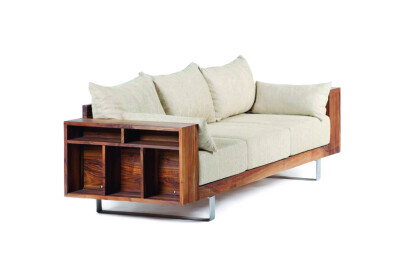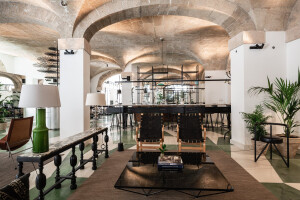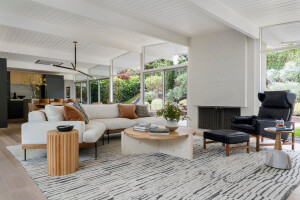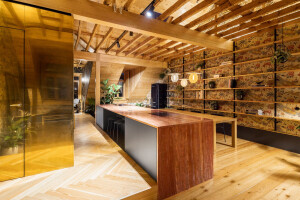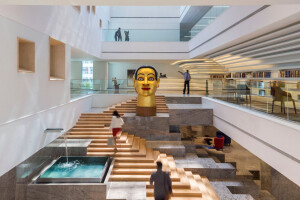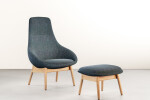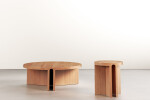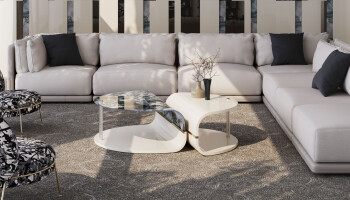It started almost by accident nearly a century ago when our great grandfather, Gano, stumbled upon a primitive hand-carving technique that originated from a small village close to our hometown of Konjic, just south of Sarajevo on the Neretva River. As a hobbyist, Gano mastered the technique and improved upon it, passing his skills down to his entrepreneurial son, Adem. In 1927, Adem launched a new company incorporating the technique in the making of luxury furniture. Adem’s business became an instant success. Others soon followed his example, and in the peacetime between the two World Wars, several fine furniture workshops were opened in Konjic, producing hand-carved furniture and decorative objects in local hardwoods. With this legacy as our foundation, our family has been designing and building heirloom-quality hand-carved furniture for more than four generations.
Today, the unique carving and furniture style developed by our ancestors has become known as the “Bosnian Konjic style.” The quality and uniqueness of the work has garnered global acclaim, and several of our pieces are under state protection as part of Bosnia’s national cultural heritage. In 2014, the Konjic woodcarving technique largely created and developed by the Niksic family was officially nominated by the government of Bosnia and Herzegovina to the UNESCO World Intangible Cultural Heritage List, and Niksic pieces are currently featured in a UNESCO publication highlighting exceptional craftsmanship in Bosnia and Herzegovina.
We can proudly say that our company belongs to the category of European family-owned enterprises that through generations of uncompromising quality and innovation have become symbols of a city and its traditions. But the road to success was not without challenges. World War II and the subsequent advent of socialism in Yugoslavia forced our grandfather and virtually all the woodcarvers in Konjic to close their businesses. And although it was nearly impossible to run a private business during the early years of socialism, Adem’s sons Mukerem and Besim reopened the business in 1950s and kept it alive. Then came the end of socialism and instead of greater freedom a series of wars broke out that tore Yugoslavia and Bosnia apart.
The Days of Manulution: Recrafting Modern Design
Besim did not waste time after the Bosnian war ended in 1995. He reopened and started growing the company with the help of his sons Adem and Orhan. New investments were made and the business expanded quickly. Adem took over management of the company, and he and his brother Orhan developed a new vision for the company, inspired by their appreciation for modern design and their disillusionment with the increasing divorce between modern design and quality craftsmanship. They decided to promote a new idea in furniture design and production: one that emphasizes craftsmanship and shows how traditional hand-carving techniques can seamlessly blend with and open new possibilities for modern design. They coined a term to depict their vision: Manulution, which to them represented a revolution of skilled manual work--a revolution of craftsmanship for the modern era. As soon as the products of Manulution came to life, they generated international recognition. Two products received the prestigious Interior Innovation Award at the Cologne Furniture Fair (2011 and 2012) and generated coverage in prestigious international media such as the Monocle and the New York Times.
The Making of Zanat
Old ideas always evolve and new ones are born, in particular during happy, idle times. Thus, while vacationing on the idyllic Croatian Island of Korcula (where Marco Polo was allegedly born) the idea for Zanat came to life. There, Orhan and his friend Mark Bartolini (an aid worker and hobbyist craftsman who developed a close friendship with Orhan and the Niksic family during the Bosnian war) discussed two of their favorite topics: ways to advance the development of Bosnia, and the art of furniture making. Based on his long experience in international development as a senior economist with the World Bank and other international organizations, Orhan had ideas how to use his family’s business as a vehicle to address some prominent market and government failures that hinder economic growth and job creation in Bosnia. Mark, an appointee in the Obama administration, with a lifelong commitment to social justice and the environment, discussed with Orhan how these economic drivers could be melded with their shared concerns over sustainability, good governance and social justice to create a company that could serve as a model for Bosnia’s reemergence in the global marketplace. The idea for Zanat was born. Soon after, a team consisting of Adem, Mark and Orhan, together with Andrew Genung, an international development professional and entrepreneur, Paul Schoss, a Silicon Valley entrepreneur, and Dzenan Dzumhur, a family friend with a wide range of business experience put together a plan that made Zanat a reality.
Now, at a time when Bosnia is suffering one of the highest unemployment rates in Europe, Zanat is creating opportunity. Our vision has incorporated a developmental model that seeks to help reestablish Bosnia’s place in the global furniture market, while also demonstrating the highest standards of corporate governance and sustainability. We are expanding the skills of already accomplished wood workers and hiring and training new staff with salaries well above most other entry level opportunities in Bosnia. At the same time, we are committed to making our products with sustainably harvested wood from local suppliers, as we know that Bosnia’s abundant forests must be well-managed if succeeding generations are to enjoy both their bounty and their beauty. Zanat is committed to achieving a carbon neutral footprint through product longevity, zero wood waste, and reforestation and conservation.
The furniture produced by our grandfather could be found in the residencies and offices of aristocrats and elites throughout South Central Europe. Today our furniture is finding favor in a global market and can be found in fine homes, commercial developments, and religious institutions throughout Europe, the United States and the Middle East. While the designs and scale of our company have, and will continue to, evolve--our company values will not. We are committed to both the satisfaction of our customers and to our traditions. We believe that you, our customer, should feel secure that when you buy a piece from Zanat you are not only improving your home, you are improving our world.
Zanat Product
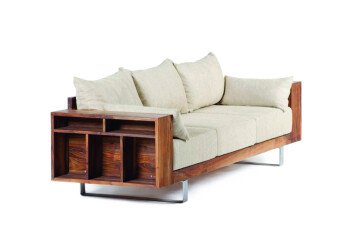
Native Sofa Zanat
Elegance, comfort and expanded functionality through the application of solid European hardwoods were the ideas that gave birth to the design of this...
Other Furniture Products
Member Promotion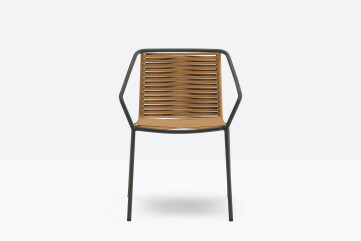
Philía 3905 PEDRALI
Philía is a collection of outdoor seating reminiscent of the traditional Italian garden chairs, it recalls relaxed lifestyle in open air, typic...

Elegant Carved Legs Dining Table MODENESE LUXURY INTERIORS
With its elegant carved legs, exquisite craftsmanship, and timeless design, the Elegant Carved Legs Victorian Dining Table is more than just a piece o...
Our Products are Used in Projects by
Projects with Products from Zanat
Zanat Offices
Furniture Brands
Is this your brand and would you like to remove content from other manufacturers on your brand page? Contact Archello
